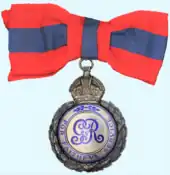| Imperial Service Medal | |
|---|---|
  Obverse and reverse of the medal | |
| Awarded for | 25 years of meritorious service |
| Presented by | |
| Eligibility | Civil Servants of the United Kingdom, the Dominions, Colonies, Protectorates, and Overseas Territories. |
| Established | 8 August 1902[1] |
| Last awarded | 2023 Special Honours |
Ribbon bar of the medal | |
| Order of Wear | |
| Next (higher) | Polar Medal[2] |
| Next (lower) | Indian Police Medal[2] |


The Imperial Service Medal is a medal affiliated with the Imperial Service Order. The medal was established under the statutes of the Imperial Service Order, on 8 August 1902, by King Edward VII,[1] with the first awards appearing in the London Gazette in May 1903.[3]
Eligibility
It is presented upon retirement to selected civil servants, including those belonging to the lowest support and clerical branches,[4][5] who complete at least 25 years meritorious service. It is primarily an award to manual and industrial grades, including workers in H M Dockyards and, prior to 1969 when it moved from central government control, the Post Office.[6] Prison officers were eligible prior to the establishment in 2010 of the Prison Services Long Service Medal.[7] The minimum period of service was 20½ years in India prior to independence in 1947, and 16 years in unhealthy climates in other countries.[6]
Appearance
When originally created the Imperial Service Medal was a seven-pointed star, or a laurel wreath for women, in the same pattern as the Imperial Service Order, but with the star or laurel in bronze.[8] In 1920 an amendment of the statutes changed the appearance of the medal to its current form: a circular silver medal, 32 mm (1.3 in) in diameter, bearing the effigy of the reigning sovereign on the obverse.[9] To date, here have been six versions:[10]
 George V, 1920-30. Inscribed GEORGIVS V D. G. BRITT: OMN: REX F. D. INDIAE. IMP.
George V, 1920-30. Inscribed GEORGIVS V D. G. BRITT: OMN: REX F. D. INDIAE. IMP. George V, crowned head 1931-37. Inscribed GEORGIVS VI DEI. GRA. BRITT. OMN REX. FID. DEF.
George V, crowned head 1931-37. Inscribed GEORGIVS VI DEI. GRA. BRITT. OMN REX. FID. DEF. George VI, 1937-48. Inscribed GEORGIVS VI D: G: BR: OMN: REX ET INDIAE IMP:
George VI, 1937-48. Inscribed GEORGIVS VI D: G: BR: OMN: REX ET INDIAE IMP: George VI, 1949-53. Inscribed GEORGIVS VI DEI: GRA: BRITT: OMN: REX FID: DEF:
George VI, 1949-53. Inscribed GEORGIVS VI DEI: GRA: BRITT: OMN: REX FID: DEF: Elizabeth II, 1953-54. Inscribed ELIZABETH II D: G: BR: OMN: REGINA F.D.
Elizabeth II, 1953-54. Inscribed ELIZABETH II D: G: BR: OMN: REGINA F.D. Elizabeth II, 1954-2022. Inscribed ELIZABETH II DEI GRATIA REGINA F.D.
Elizabeth II, 1954-2022. Inscribed ELIZABETH II DEI GRATIA REGINA F.D. Common reverse, all issues since 1920.
Common reverse, all issues since 1920.
The reverse bears the image of a naked man resting from his labours[10] with the inscription "For Faithful Service".[9][11] The name of the recipient is impressed on the rim of the medal. Recipients are listed in the London Gazette.[12]
References
- 1 2 "No. 27463". The London Gazette. 8 August 1902. p. 5171.
- 1 2 "No. 56878". The London Gazette (Supplement). 17 March 2003. p. 3352.
- ↑ "No. 27559". The London Gazette (Supplement). 29 May 1903. p. 3521.
- ↑ Recognition: Imperial Service Medal, Ministry of Defence, says "Those eligible for consideration are Skill Zone and Band E grades" so including AA and AO grades
- ↑ Damon Rogers. The workman's medal: an analysis of the award of the Imperial Service Medal during the reign of Edward VII. Orders and Medals Research Society Journal, June 2022, Vol 61 No 2. Page 131.
- 1 2 Nick Tucker. The Imperial Service Medal: is this humble medal underrated?. Orders and Medals Research Society Journal, March 2021, Vol 60 No 1. Pages 16–22.
- ↑ "No. 59672". The London Gazette. 17 January 2011. p. 615.
- ↑ Captain H. Taprell Dorling. Ribbons and Medals. p. 38. Published A.H.Baldwin & Sons, London. 1956.
- 1 2 "No. 31953". The London Gazette. 25 June 1920. p. 6875.
- 1 2 John Mussell (ed). Medal Yearbook 2015. p. 84. Published by Token Publishing Ltd. Honiton, Devon.
- ↑ "Imperial Service Order". yourarchives.nationalarchives.gov.uk/. The National Archives. 8 April 1986. Retrieved 16 June 2012.
- ↑ For example: "No. 61990". The London Gazette (1st supplement). 11 July 2017.